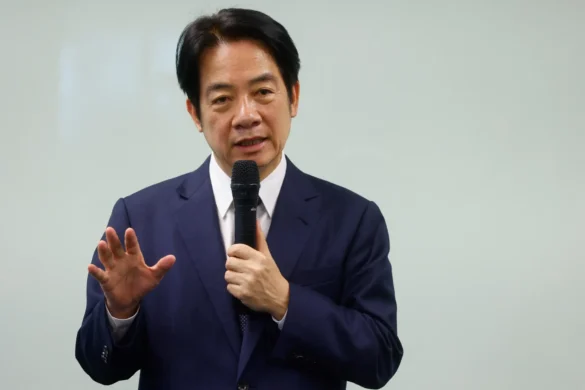In a bold address on Taiwan’s National Day, Taiwan President William Lai reaffirmed his commitment to safeguarding Taiwan’s sovereignty, vowing to resist any attempts of annexation by external powers, specifically alluding to China’s ongoing claims over the self-ruled island. Lai’s remarks come at a time of heightened tensions across the Taiwan Strait, as China continues to assert its stance on reunification.
Lai, who took office earlier this year, made it clear that Taiwan would maintain its current political status as a self-governing democracy. His address, widely viewed as a declaration of Taiwan’s resolve to resist external pressure, emphasized that the island would not submit to China’s ambitions to absorb it. “We will uphold our commitment to resist annexation or any encroachment upon our sovereignty,” Lai declared during the ceremony in Taipei, directly addressing growing regional concerns.
Resisting Annexation While Promoting Stability
President William Lai’s vow to resist annexation came alongside promises to preserve peace and stability in the region. Lai noted that while Taiwan is firm on its self-governing status, it remains committed to maintaining a peaceful relationship with China, avoiding unnecessary escalations in the Taiwan Strait.
Lai reiterated Taiwan’s position of not seeking formal independence, as it already operates as an independent nation in practice. “The Republic of China and the People’s Republic of China are not subordinates to one another,” Lai said, drawing a clear line between Taiwan’s democratic governance and China’s one-party rule. He added, “On this land, democracy and freedom thrive. The People’s Republic of China has no right to represent Taiwan.”
However, Lai also called for cooperation with Beijing on non-political matters such as climate change, public health, and regional security—a gesture of goodwill that seeks to reduce tensions while reinforcing Taiwan’s firm stance on its sovereignty.
Chinese Reaction: Tensions Rise Over Taiwan’s Status
Beijing’s response to Lai’s National Day speech was swift and critical. China’s Ministry of Foreign Affairs condemned Lai’s remarks, accusing him of aggravating tensions with his “intransigent position on Taiwan independence.” Mao Ning, a spokesperson for the ministry, reiterated China’s claim that both sides of the Taiwan Strait belong to one China and dismissed Lai’s assertions of sovereignty as attempts to provoke Beijing.
Mao Ning stressed that China would not waver in its quest for reunification and criticized Lai for trying to “escalate tensions for political gain.” Beijing has long insisted that Taiwan must be reunified with mainland China, either peacefully or by force, and views any suggestion of independence as a violation of its territorial integrity.
Lai’s stance has been consistent since he took office earlier this year, but the Taiwanese leader has adopted a more assertive tone in recent months. His speeches have gone beyond those of his predecessor, Tsai Ing-wen, who was cautious in her public addresses regarding Taiwan’s relationship with China. Lai’s firmer rhetoric reflects the growing geopolitical challenges Taiwan faces as China intensifies its military activities around the island, including regular military exercises and increased pressure on the international community to isolate Taiwan diplomatically.
Regional and Historical Context
Taiwan’s struggle for international recognition and security remains a key issue as it faces ongoing pressure from Beijing. William Lai’s vow to resist annexation also highlights Taiwan’s historical perspective. Lai reminded the public that the Republic of China, which Taiwan identifies with, was founded in 1911, long before the People’s Republic of China was established in 1949 following the Chinese Civil War. He rejected China’s claim of Taiwan as a “breakaway province,” instead asserting that Taiwan has never been ruled by the current Chinese government.
Further complicating the situation, last month Lai questioned the legitimacy of China’s territorial claims based on so-called historic lands. He argued that if China were truly focused on restoring territorial integrity, it would attempt to reclaim areas lost to other nations, not just Taiwan.
Military and Strategic Implications
In response to Lai’s speech, analysts predict that China will likely ramp up its military presence in the Taiwan Strait in the coming days. Military drills and naval patrols around Taiwan have become more frequent, with Beijing using these actions as a show of force against what it perceives as Taiwan’s moves toward formal independence.
Despite these threats, Lai continues to advocate for status quo policies, which aim to keep Taiwan’s independence intact without formally declaring it. He insists that Taiwan is already an independent nation and has no need to proclaim itself as such. This careful balancing act is intended to avoid a direct confrontation with China while ensuring that Taiwan’s democratic freedoms and sovereignty remain secure.
Domestic Focus Amidst International Tensions
Although Lai’s speech largely focused on resisting external threats, he also took time to address pressing domestic issues, including energy policy, housing, and climate change—key areas of concern for Taiwanese citizens. Lai’s administration has consistently sought to bolster Taiwan’s resilience both at home and abroad, ensuring that the island is well-prepared to face future challenges.
As Taiwan President William Lai vows to resist annexation, the island’s political and security future remains in the balance. With the international community watching closely, Lai’s leadership will be critical in determining how Taiwan navigates the growing challenges posed by China’s ambitions for reunification.
Stay connected to know more on arcnews.online for global news like Taiwan President William Lai Vows to Resist the Annexation. For videos updates visit our YouTube. Do subscribe to Arcnews to get latest updates directly in your mail box.
Have A Great Day.


